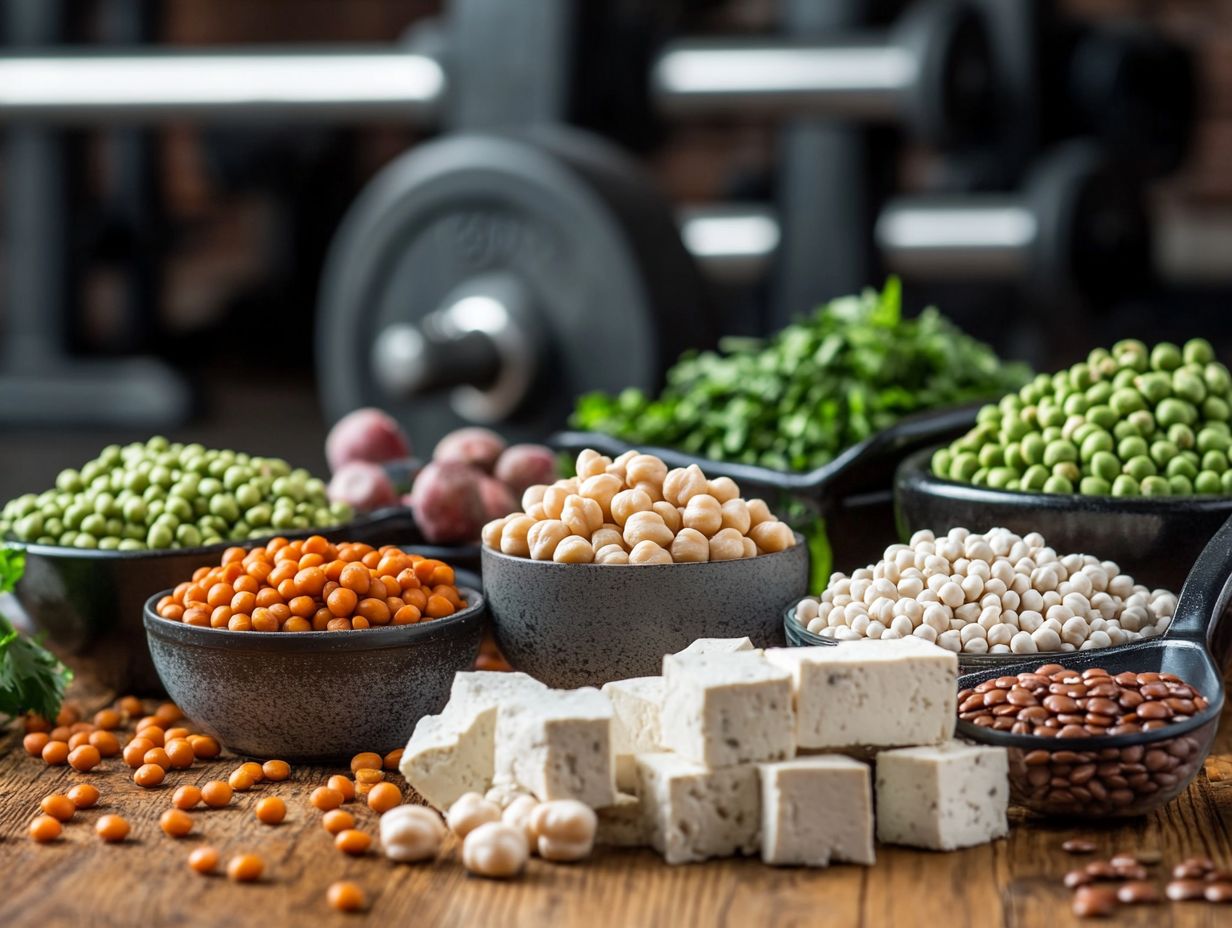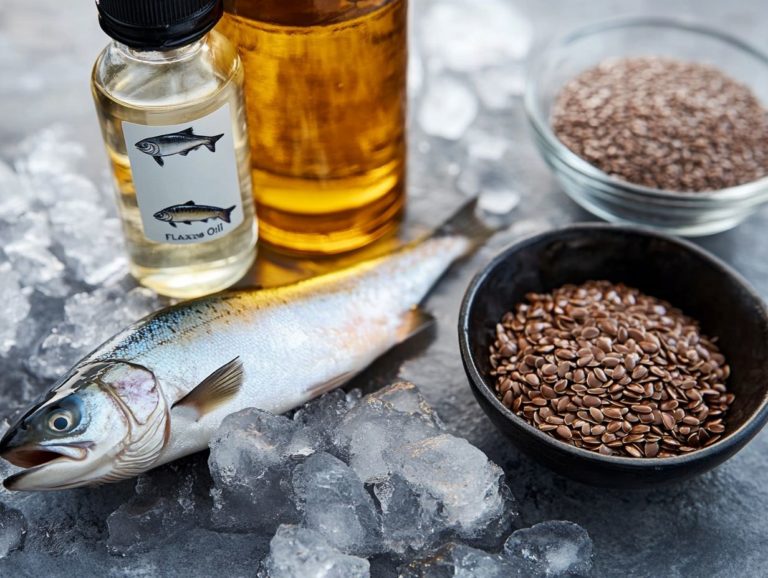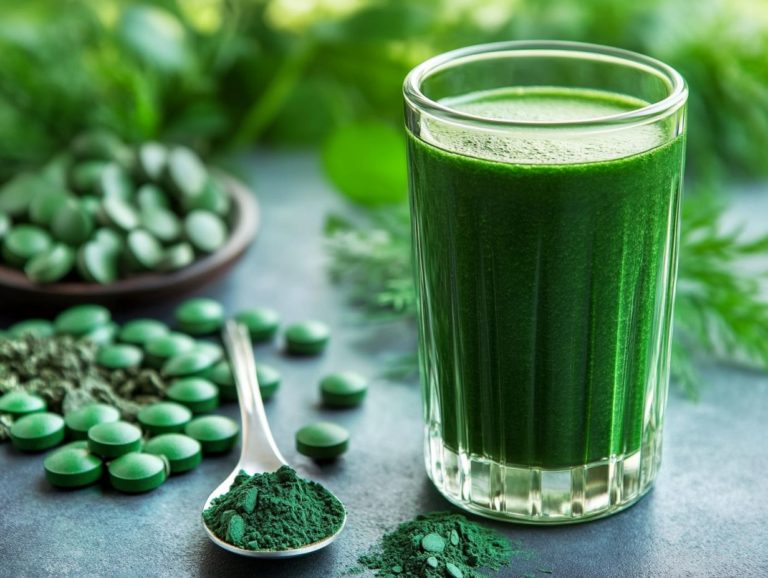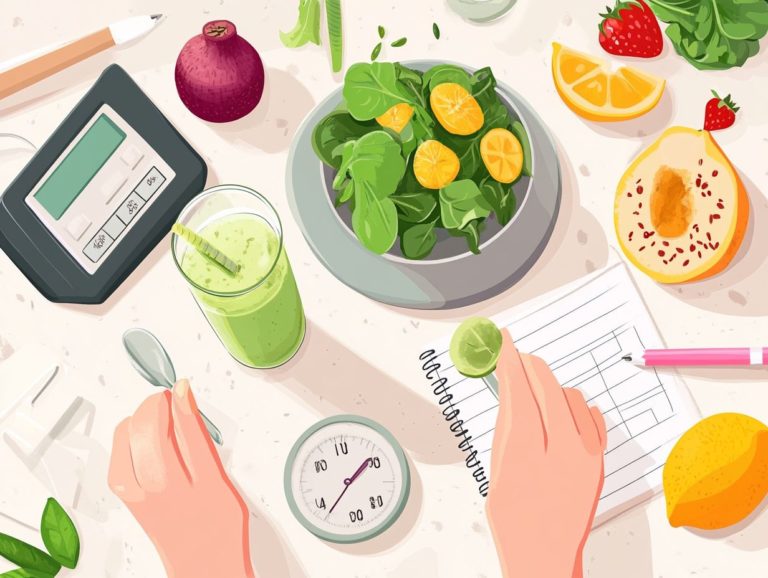Top 10 Vegan Protein Sources for Lifters
In a world increasingly embracing plant-based diets, you may be excited to find out how to effectively meet your protein needs without leaning on animal products.
This article presents the top 10 vegan protein sources specifically designed to fuel your workouts and support muscle growth. From the versatility of tofu to being rich in nutrients, each option s unique benefits and how they seamlessly fit into your routine will be examined.
Common concerns surrounding vegan protein will be addressed. Practical tips for incorporating these options into your diet will be shared, and top supplement recommendations will be highlighted.
Dive in now to discover how a vegan diet can elevate your lifting journey!
Contents
- Key Takeaways:
- 1. Tofu
- 2. Lentils
- 3. Chickpeas
- 4. Quinoa
- 5. Edamame
- 6. Hemp Seeds
- 7. Spirulina
- 8. Seitan
- 9. Nutritional Yeast
- 10. Beans
- How Much Protein Do Lifters Need?
- What Are the Benefits of Plant-Based Protein for Lifters?
- What Are the Potential Drawbacks of Plant-Based Protein for Lifters?
- What Are Some Tips for Incorporating Vegan Protein into a Lifter’s Diet?
- Can a Vegan Diet Provide Enough Protein for Muscle Growth?
- Frequently Asked Questions
- What Are the Top 10 Vegan Protein Sources for Lifters?
- How Much Protein Do I Need as a Lifter on a Vegan Diet?
- Can I Get Enough Protein from a Plant-Based Diet?
- Do I Need to Take Protein Supplements as a Vegan Lifter?
- Are There Any Vegan Protein Sources That Are Also High in Other Nutrients?
- Can I Build Muscle on a Vegan Diet?
Key Takeaways:
- Incorporating plant-based protein sources like tofu, lentils, and quinoa can provide essential protein for muscle growth in lifters.
- Vegan protein sources like hemp seeds, nutritional yeast, and beans offer added benefits such as fiber and healthy fats for a well-rounded diet.
- A vegan diet requires some planning, but it can provide enough protein for muscle gain when paired with a balanced diet and proper supplementation.
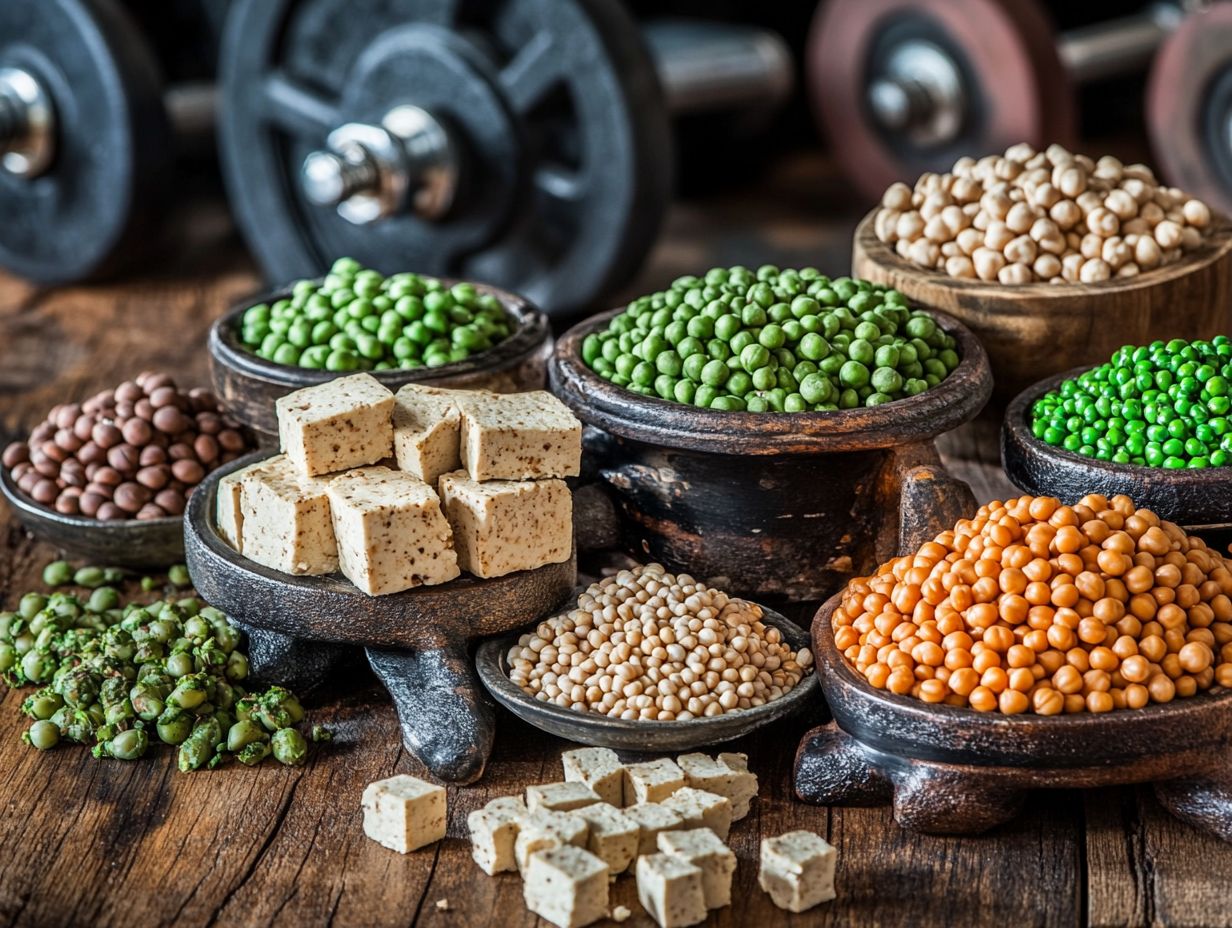
1. Tofu
Tofu, a remarkably versatile plant-based protein, stands as a cornerstone in many vegetarian and vegan diets. It offers an exceptional opportunity to meet your protein intake needs while supporting muscle health, particularly beneficial for bodybuilders and fitness enthusiasts.
Crafted from soybeans, tofu is abundant in essential amino acids vital for building lean muscle, making it an ideal choice for enhancing your workouts and overall nutrition.
You ll find that different types of tofu silken, firm, and extra-firm open the door to a range of culinary possibilities. Silken tofu, with its creamy texture, is perfect for smoothies or desserts. Meanwhile, firmer varieties thrive in stir-fries, on the grill, or tossed into salads, providing a satisfying bite.
For bodybuilders like yourself, incorporating tofu into meals is a breeze. Simply add it to a colorful stir-fry with vegetables and quinoa, and you ve created a balanced dish rich in nutrients.
With its low-carb content, tofu aligns well with various dietary needs. This makes it an excellent choice for anyone with specific macronutrient goals, which are the nutrients your body needs in large amounts.
2. Lentils
Lentils are truly a powerhouse of protein, making them an essential component of any vegetarian or vegan diet. Not only do they provide ample protein, but they also come packed with a wealth of essential nutrients that support your overall health and fitness.
Rich in fiber, lentils aid digestion and help you maintain a healthy weight. This makes them an excellent choice for anyone aiming to enhance their diet. With their low glycemic index, they play a crucial role in stabilizing blood sugar levels, contributing to sustained energy throughout your day.
Cooking lentils is a breeze; you can boil, saut , or toss them into soups and salads for an instant nutritional boost. Their versatility means they seamlessly fit into various dishes like curries, stews, or even lentil burgers offering a delicious and nutritious option for everyone, not just vegetarians.
3. Chickpeas
Chickpeas, often referred to as garbanzo beans, are an exceptional source of plant-based protein. They are a must-have for anyone embracing a vegetarian or vegan lifestyle, especially those prioritizing muscle health.
But it s not just about the protein; these legumes are also packed with dietary fiber, which is crucial for promoting digestive health and maintaining stable blood sugar levels. Incorporating chickpeas into your meals is a delicious way to boost nutrition.
You might blend them into creamy hummus, toss them into salads for that extra crunch, or use them as a hearty base for stews.
Feeling snacky? Roast them for a crunchy treat that rivals traditional chips. Whether you add them to a flavorful curry, mix them into grain bowls, or saut them with spices, chickpeas elevate your dishes while delivering essential nutrients.
Start adding these plant-based proteins to your meals today and feel the difference in your strength and energy!
4. Quinoa
Quinoa is often celebrated as a superfood for good reason. Its impressive nutritional value offers a complete source of protein, containing all nine essential amino acids. This makes it an ideal companion for a plant-based diet that prioritizes muscle health.
But quinoa isn t just about protein; it’s a versatile grain alternative that can elevate a variety of dishes, from vibrant salads and hearty bowls to comforting soups and flavorful stir-fries. Its nutty flavor and slightly chewy texture create a delightful contrast to traditional grains like rice or pasta.
Cooking quinoa takes only about 15 minutes. It’s perfect for busy weeknight meals.
Nutritionally, it outshines many other grains, boasting higher levels of fiber, iron, and magnesium that support heart health and aid digestion.
Ready to take your meals to the next level? Try adding quinoa to your breakfast! Adding fruits or nuts can transform a simple meal into a nutritious powerhouse that fuels your day.
5. Edamame
Edamame, those young soybeans harvested before they reach maturity, offer a delightful and nutritious snacking experience. They serve as a premium source of plant protein, making them a go-to choice for bodybuilders and health enthusiasts eager to enhance their muscle health.
Rich in essential amino acids, fiber, vitamins, and minerals, edamame not only promotes muscle growth but also aids digestion and helps manage cholesterol levels.
This vibrant green snack is easy to add to your diet; you can enjoy them steamed and lightly salted as a standalone treat, toss them into salads for an added crunch, or blend them into savory dips like hummus.
For a more substantial meal, consider adding edamame to stir-fries or grain bowls. They effortlessly enhance a variety of flavors while elevating the overall nutritional profile of your dish.
6. Hemp Seeds
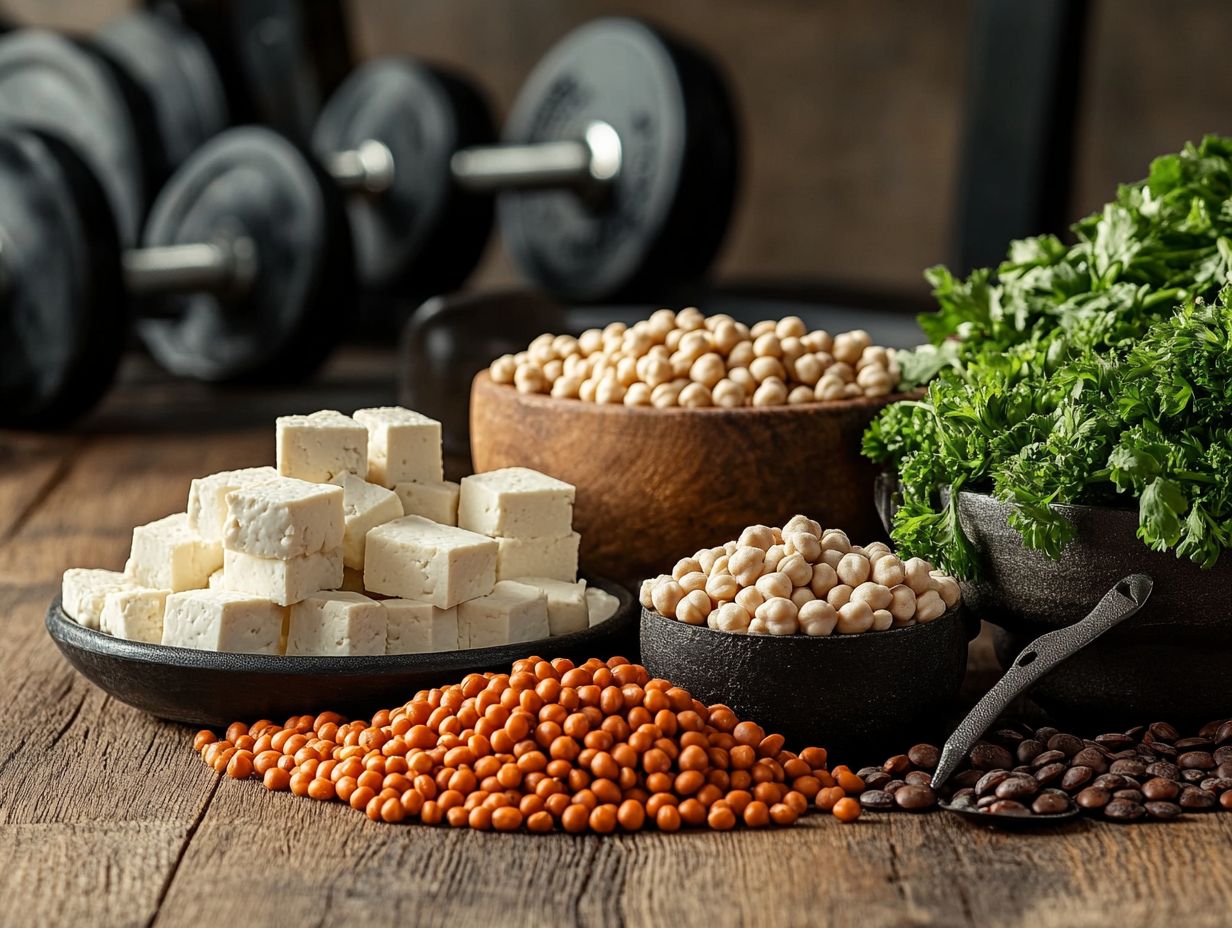
Hemp seeds are a nutrient-dense wonder brimming with protein and essential fatty acids. They’re an exceptional addition to your plant-based diet if you’re looking to build lean muscle and support overall health. These tiny powerhouses not only provide a complete source of protein with all essential amino acids, but they also offer a superior balance of omega-3 and omega-6 fatty acids compared to other protein sources.
Unlike traditional options like beans or quinoa, hemp seeds pack higher levels of healthy fats and fiber, which contribute to heart health and aid digestion.
Incorporating them into your daily meals is effortless. You can:
- Sprinkle hemp seeds onto salads
- Blend them into smoothies
- Fold them into baking recipes like muffins or pancakes
Don’t miss out on adding these nutritional powerhouses to your meals today!
7. Spirulina
Spirulina, that vibrant blue-green algae, often earns its title as a superfood thanks to its impressive protein profile and rich variety of essential amino acids. It s no wonder that it’s a favorite among bodybuilders and those following plant-based diets.
This nutrient-dense wonder boasts an astonishing protein content of 60-70%, encompassing all nine essential amino acids. But that’s just the beginning; it’s also packed with vitamins, minerals, and antioxidants that can elevate your overall health.
If your goal is to optimize recovery and muscle growth, integrating spirulina into your diet can be especially beneficial.
A delicious and simple way to enjoy spirulina is by blending it into smoothies. Just add a teaspoon to your favorite mix of fruits and vegetables for an energizing boost. You can also integrate it into energy bars, add it to salad dressings, or even sprinkle it over soups, transforming every meal into a nutrition powerhouse.
8. Seitan
Seitan, made from wheat gluten, is a standout meat alternative packed with protein. It s essential for bodybuilders and anyone embracing a plant-based diet aimed at enhancing muscle health.
With about 25 grams of protein per 3.5 ounces, seitan competes fiercely with traditional protein sources like chicken and beef. While those options deliver high protein content, they often come with more fat.
Unlike soy-based alternatives such as tofu or tempeh, seitan has a chewy texture that closely mimics meat, delivering a satisfying mouthfeel across various dishes.
If you’re eager to integrate seitan into your meals, try:
- Marinating and grilling it
- Stir-frying it with vibrant vegetables
- Blending it into sauces to elevate your culinary creations
Its remarkable ability to absorb flavors makes it a versatile choice for many cuisines, from savory Asian stir-fries to comforting Italian pastas.
9. Nutritional Yeast
Nutritional yeast is a yeast that has been heat-treated so it won t ferment, and it deserves a special spot in your pantry. Its cheesy flavor and impressive protein content make it an excellent choice for bodybuilders and anyone on a plant-based diet seeking high-calorie foods.
This ingredient is rich in B vitamins, including the important B12, essential for energy production and overall metabolic health. It can elevate the taste of various dishes, whether you sprinkle it over popcorn for a delicious snack or mix it into sauces and soups for added richness.
Try blending it into your smoothies for an exciting nutrient boost! By enhancing both the flavor and protein content of your meals, nutritional yeast delights your taste buds while helping you achieve your nutritional goals.
10. Beans
Beans are a versatile and nutritious source of protein, essential for anyone on a plant-based diet. They provide valuable nutrients that support muscle health and overall wellness.
With a delightful variety available think black beans, chickpeas, and kidney beans you’ll find each type offers unique flavors and textures, transforming your meals into vibrant experiences.
Beyond protein, these legumes are loaded with fiber, which aids digestion and helps regulate blood sugar levels. Adding beans to your meals is easy and rewarding. You might consider:
- Adding them to salads for a hearty boost
- Blending them into soups for a delightful creaminess
- Mashing them into spreads for a satisfying, healthy snack
Don t miss out on the chance to transform your meals! These nutritious powerhouses promote a balanced diet, making them an excellent choice for enhancing your culinary repertoire.
How Much Protein Do Lifters Need?
Determining the right protein intake for your bodybuilding journey is essential for optimizing muscle health and maximizing performance. The appropriate amount of protein can significantly influence your training outcomes and recovery process.
Your nutritional requirements may vary based on factors like body weight, exercise intensity, and specific training goals. If you weigh more or engage in higher-intensity workouts, you might need a higher protein intake to support muscle repair and growth.
General guidelines suggest that bodybuilders should aim for approximately 1.2 to 2.2 grams of protein per kilogram of body weight each day, tailored to their training phase and individual objectives.
This personalized approach not only helps you meet your caloric needs but equips your body with the essential nutrients necessary for peak performance and effective recovery.
What Are the Benefits of Plant-Based Protein for Lifters?
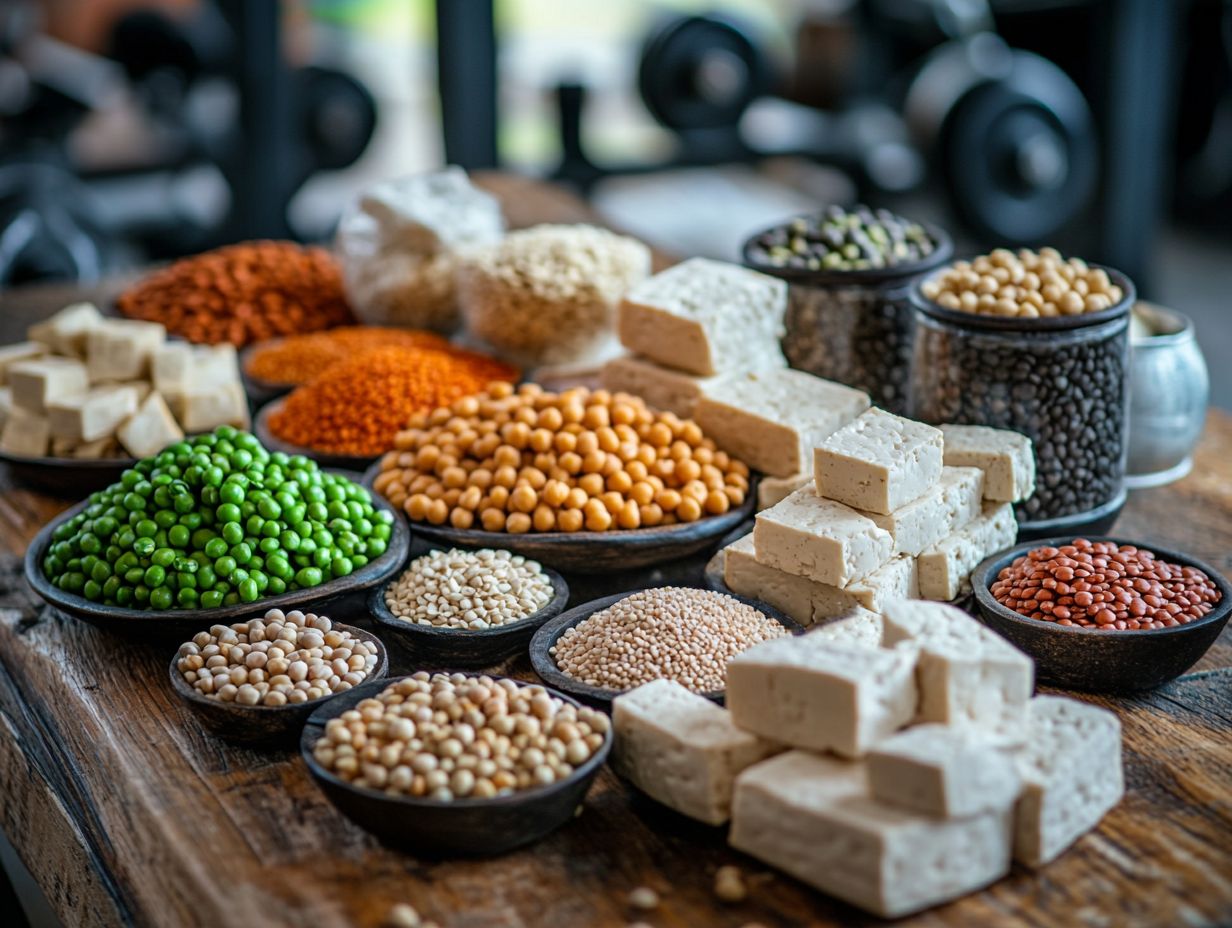
Plant-based protein offers numerous benefits for lifters. It enhances muscle recovery, improves endurance, and reduces the risk of chronic diseases. This makes it an exceptional choice for bodybuilders looking to optimize their protein intake.
These protein sources are packed with essential nutrients like vitamins, minerals, and antioxidants. They help reduce inflammation, which is crucial for speeding up recovery between workouts. Many athletes who embrace a plant-based diet report elevated energy levels and noticeable gains in muscle definition and overall performance.
Take the inspiring journey of a prominent bodybuilder who transitioned to a plant-based regimen. They experienced remarkable improvements in strength and stamina, along with a reduction in body fat percentage.
These real-life examples show how adopting plant-based protein can yield impressive results and challenge conventional views on protein sourcing in bodybuilding.
What Are the Potential Drawbacks of Plant-Based Protein for Lifters?
While plant-based protein has many benefits, there are potential drawbacks for weight lifters. One challenge is obtaining sufficient building blocks of protein and meeting higher protein needs compared to animal-based sources.
Relying solely on plant-derived proteins can create nutritional gaps, especially for those immersed in strength training or bodybuilding. Legumes, nuts, and grains may not always provide the complete protein profile necessary for effective muscle recovery and growth.
Combine different plant proteins. Pair rice with beans for a balanced amino acid profile. Keeping track of your protein intake through diverse sources, including soy products or supplements, is crucial for optimal nutrition levels.
This balanced approach ensures adequate intake while supporting your overall health and fitness goals.
What Are Some Tips for Incorporating Vegan Protein into a Lifter’s Diet?
Incorporating vegan protein into your diet can significantly enhance muscle health and recovery. Explore a variety of protein sources to supercharge your meals!
For optimal nutrient intake, combine legumes with grains think rice and beans or lentils and quinoa. This creates a complete amino acid profile essential for muscle growth. Integrate nuts, seeds, and nutritional yeast into your snacks and meals to elevate the overall protein content.
Batch-cooking high-protein staples like chickpeas or tempeh can save time. It ensures you have easy access to nutritious ingredients throughout the week. This well-rounded approach supports muscle growth and keeps your meal options exciting, preventing dietary monotony as you work toward your fitness goals.
Can a Vegan Diet Provide Enough Protein for Muscle Growth?
A well-planned vegan diet can absolutely deliver the protein needed for muscle growth. It offers a wealth of plant-based protein sources to help you reach your fitness aspirations.
Incorporate a variety of foods such as legumes, quinoa, nuts, seeds, and soy products to meet your protein requirements and ensure you re getting the essential building blocks of protein.
Consider meal ideas like:
- Chickpea stir-fries
- Tofu scrambles
- Lentil soups
These options are nutritious and incredibly flavorful, making it easy to boost your protein intake without compromising taste.
Pairing grains with legumes, like rice and beans, enhances overall protein quality. This allows you to thrive on a vegan diet while effectively building muscle.
Start your plant-based journey today and feel the difference in your workouts!
What Are the Best Vegan Protein Supplements for Lifters?
For bodybuilders seeking additional protein support, a range of vegan protein supplements think pea protein, brown rice protein, and blended plant-based protein powders can effectively meet your needs. These options complement a balanced diet.
They not only provide the amino acids you need for muscle recovery and growth, but they also come packed with vitamins and minerals that enhance your overall health.
Explore exciting options that fit your needs, and consider factors like digestibility, ingredient quality, and potential allergens to find the perfect match for your dietary preferences.
Knowing your fitness goals helps you choose the right protein source. Whether you re aiming to gain muscle mass, maintain weight, or simply infuse more plant-based nutrients into your routine, it s essential to understand what works best for you.
By exploring these factors, you ll empower yourself to make informed decisions tailored to your specific lifestyle and activity levels.
Frequently Asked Questions
-
What Are the Top 10 Vegan Protein Sources for Lifters?
The top 10 vegan protein sources for lifters include tofu, lentils, edamame, tempeh, chickpeas, quinoa, hemp seeds, green peas, black beans, and spirulina.
-
How Much Protein Do I Need as a Lifter on a Vegan Diet?
As a lifter on a vegan diet, you should aim to consume 0.8-1 gram of protein per pound of body weight. This can be easily achieved by incorporating a variety of vegan protein sources into your meals.
-
Can I Get Enough Protein from a Plant-Based Diet?
Yes, it is possible to get enough protein from a plant-based diet. Many vegan protein sources, such as beans, legumes, and tofu, are rich in protein and can meet your daily protein needs.
-
Do I Need to Take Protein Supplements as a Vegan Lifter?
No, you do not necessarily need to take protein supplements as a vegan lifter. However, they can be a convenient way to increase your protein intake if you are struggling to get enough from whole food sources.
-
Are There Any Vegan Protein Sources That Are Also High in Other Nutrients?
Yes, many vegan protein sources are also high in other nutrients. For example, quinoa is not only a good source of protein but also contains iron, magnesium, and fiber. Tofu is also a good source of calcium and iron.
-
Can I Build Muscle on a Vegan Diet?
Yes, it is possible to build muscle on a vegan diet. As long as you consume enough calories and protein from a variety of plant-based sources, you can achieve your fitness goals on a vegan diet.

